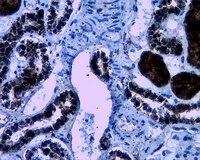07-2270 Sigma-AldrichAnti-WNK4 Antibody
This WNK4 antibody is validated for use in WB & IHC for the detection of the WNK4 protein.
More>> This WNK4 antibody is validated for use in WB & IHC for the detection of the WNK4 protein. Less<<Recommended Products
Overview
| Replacement Information |
|---|
Key Spec Table
| Species Reactivity | Key Applications | Host | Format | Antibody Type |
|---|---|---|---|---|
| H, M, R | WB, IH(P) | Rb | Affinity Purified | Polyclonal Antibody |
| References |
|---|
| Product Information | |
|---|---|
| Format | Affinity Purified |
| Control |
|
| Presentation | Purified rabbit polyclonal in buffer containing 0.1 M Tris-Glycine (pH 7.4), 150 mM NaCl with 0.05% sodium azide. |
| Quality Level | MQ100 |
| Physicochemical Information |
|---|
| Dimensions |
|---|
| Materials Information |
|---|
| Toxicological Information |
|---|
| Safety Information according to GHS |
|---|
| Safety Information |
|---|
| Storage and Shipping Information | |
|---|---|
| Storage Conditions | Stable for 1 year at 2-8°C from date of receipt. |
| Packaging Information | |
|---|---|
| Material Size | 100 µg |
| Transport Information |
|---|
| Supplemental Information |
|---|
| Specifications |
|---|
| Global Trade Item Number | |
|---|---|
| Catalogue Number | GTIN |
| 07-2270 | 04053252682810 |
Documentation
Anti-WNK4 Antibody MSDS
| Title |
|---|
Anti-WNK4 Antibody Certificates of Analysis
| Title | Lot Number |
|---|---|
| Anti-WNK4 - 2017700 | 2017700 |
| Anti-WNK4 - 2291737 | 2291737 |
| Anti-WNK4 - 2512124 | 2512124 |
| Anti-WNK4 - 3218278 | 3218278 |
| Anti-WNK4 - 3599025 | 3599025 |
| Anti-WNK4 - 3943324 | 3943324 |
| Anti-WNK4 - 4098756 | 4098756 |
| Anti-WNK4 - NRG1855956 | NRG1855956 |
| Anti-WNK4 -2618678 | 2618678 |
| Anti-WNK4 -2703742 | 2703742 |












